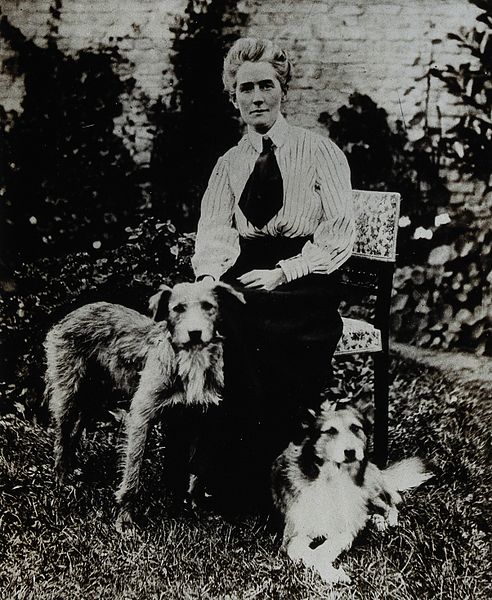There is a lot of talk about Toxic Masculinity. No one ever talks about Toxic Femininity. Though every woman who is a functional human being knows about it, as does anyone who has ever lived or worked in a predominantly female environment.
So, why does no one talk about it? Well, mostly because the left believes that “designated victims”™ are sacred and must never be called on their own bullshit, no matter how smelly. Hence also the bizarre idea of racial “privilege” that tells you holocaust survivors should be attacked for “white privilege” but the Obama girls raised as the creme de la creme, and never facing a day of privation in their lives don’t have any privilege and are victims.
But there’s also other stuff going into it. To an extent — to the extent that historically for biological reasons men dominated public life — the fact that no one talks about the bad side of female modes of being in society is the result of patriarchy.
Men are ridiculously, idiotically, insanely blinkered about women. They don’t really see women as they see other men, but through rosy glasses as much better than men. The “oh so smart” former president with the depth of a rain puddle in Colorado told us that women are so much better than men and that the world would be better under women. Which means he’s basically a bog standard male who has never given the matter a thought, and is going on what “everybody knows.” (It occurs to me this man, if he’d been born to an ultra conservative Arab family in one of the ultra conservative Muslim countries would also be telling us that women’s hair emits seductive rays. He’s a suit that speaks. Or an empty chair, if you prefer.)
Of course it is right evolutionarilly that men should feel that way about women. It keeps the species going. It is also bizarre though, and leaves men curiously defenseless now that women view themselves as an aggrieved class and are trying to take over public life and exclude men.
In fact it leaves as the only defense in society that most women — even the feminists who pretend otherwise — unless completely and extensively broken and indoctrinated know what other women are and therefore will not trust any of them. As they shouldn’t. I can’t imagine a worse hell than what Obama is proposing.
Sarah Hoyt, “Toxic Femininity”, According to Hoyt, 2019-12-18.
March 23, 2020
March 16, 2020
QotD: Company incentives to prevent sexual harassment
One of the predictions I’m seeing everywhere, for instance, is how now Human Resources will need a lot more power over companies to prevent more #metoo incidents of sexual importuning of women.
The funny thing about this is that anyone with two eyes and a modicum of understanding of the world knows that this is not where the crazy is headed. As the attempt to drown out the legitimate cases of harassment — mostly by leftists, in leftist-dominated institutions — by claiming #metoo and that all men were essentially harassers becomes more frantic, it has become obvious that any man can be accused of harassment at any time by anyone.
So, here is a genuine prediction: I predict that instead of giving HR more power, this will give companies pause before hiring women, which will lead to a lot of decent and qualified women being left unemployed.
The second-order effect of that, for companies that can’t avoid hiring women, is two-fold: they’ll either hire women to “make-believe” positions, in which they interact only or primarily with other women, creating a drain on the bottom line, or they will allow a lot more work-at-home by both men and women. I predict we’ll see a great move towards that in the next year. Sure, it’s still possible to claim someone is harassing you via the phone, but one-party consent states at least will allow men to record everything in order to defend themselves.
Weirdly, I believe the long-term result of this will be the dismantling of the daycare and child-warehousing practice which has led to a lot of the left’s ascendency in education.
This is because no matter how much you wish to wishful think that companies will just give Human Resources more power, people who actually live and work in the world know this isn’t likely. Human Resources would mostly just make it impossible for anyone to get any work done.
Sarah Hoyt, “Nobody Expects These Predictions”, PJ Media, 2017-12-31.
March 14, 2020
The still-secret “settlement” between the federal government and five hereditary chiefs of the Wet’suwet’en
Chris Selley points out some of the disturbing features of the as-yet-unrevealed agreement between Her Majesty’s Canadian government and five unelected First Nation chiefs that eventually got the railways running again:

“DSC02285” by Bengt 1955 is licensed under CC BY-NC 2.0
For starters, we still don’t know the details of the arrangement, struck earlier this month between Wet’suwet’en hereditary chiefs and federal and provincial government officials, that allowed for pipeline work to resume. Those details could well represent positive progress on establishing just what the Wet’suwet’en’s legal claim on their lands — affirmed by the Supreme Court in 1997 — really means. But did the government have any business negotiating with the chiefs in question in the first place?
Tait-Day doesn’t think so. The Office of the Hereditary Chiefs of the Wet’suwet’en, she told the committee, is “not accountable to the (Wet’suwet’en) nation.”
“By refusing to hear from elected councils, these governments have without merit prevented the most credible current governing voices from being heard,” she told the committee. “The Indian Act system must be reformed, but that does not invalidate the role of the elected councils. While imperfect, they continue to speak for the people until a better model is implemented.”
Even setting aside the exclusion of elected councils, the negotiations were of dubious legitimacy. They weren’t with the hereditary chiefs per se; rather, they were with the hereditary chiefs who oppose the pipeline. Not all do, and some support it — including Tait-Day, Gloria George and Darlene Glaim, founders of the Wet’suwet’en Matrilineal Coalition. For their apostasy, male chiefs simply stripped them of their titles. This is not in dispute: “We’ve stripped the names from three female hereditary chiefs for supporting the pipeline,” John Ridsdale, whose hereditary title is Chief Na’Moks, told APTN News in 2018. “A name is more important than money.”
Using the title of Chief Woos, Frank Alec has become the leading public face of the anti-pipeline hereditary chiefs. On his behalf, Canadians both Indigenous and non-Indigenous have shut down rail lines and blocked access to the B.C. legislature and marched in the streets. Until 2018, the title of Chief Woos belonged to Glaim. He took it from her precisely because she dared support the pipeline and the benefits that will flow from it to her people.
“By negotiating directly with (the Office of the Hereditary Chiefs of the Wet’suwet’en), Canada and British Columbia give legitimacy to a group of bullies and abusers of women,” Tait-Day told the committee. “We cannot be dictated to by a group of five guys.”
March 5, 2020
Chain Your Woman to the Stove – Feminism in the 1930s | BETWEEN 2 WARS I 1938 Part 2 of 4
TimeGhost History
Published 4 Mar 2020Under the yoke of economic depression and more and more authoritarian rulers, Western women face renewed misogyny, patriarchy, and decreasing independence. But not all women think this is such a bad thing.
Join us on Patreon: https://www.patreon.com/TimeGhostHistory
Hosted by: Indy Neidell
Written by: Spartacus Olsson
Directed by: Spartacus Olsson and Astrid Deinhard
Executive Producers: Bodo Rittenauer, Astrid Deinhard, Indy Neidell, Spartacus Olsson
Creative Producer: Joram Appel
Post-Production Director: Wieke Kapteijns
Research by: Spartacus Olsson
Edited by: Daniel Weiss
Sound design: Marek KamińskiSources:
Bundesarchiv_Bild:
101III-Alber-174-14A, 102-04517A, 102-17313, 102-17818,
111-098-069, 137-055879, 146-1973-010-31, 146-1975-069-35,
146-1976-112-03A, 146-2006-205, 146-2008-0271,
183-2000-0110-500, 183-2005-0502-502, 183-2005-0530-500,
183-E10868, 183-E20457, 183-H28245, 183-J02040,
183-S08630, 183-S68014, 183-S68021, 183-S68029,
noun_pipe By Icon Lauk,
noun_company By wardehpillai,
noun_Farmer By Francisca Muñoz Colina.Colorizations by:
– Daniel Weiss
– Norman StewartSoundtracks from Epidemic Sound:
– “Sophisticated Gentlemen” – Golden Age Radio
– “The Inspector 4” – Johannes Bornlöf
– “Magnificent March 3” – Johannes Bornlöf
– “Last Point of Safe Return” – Fabien Tell
– “Step On It 5” – Magnus Ringblom
– “First Responders” – Skrya
– “Step Lightly” – Farrell Wooten
– “Try and Catch Us Now” – David Celeste
– “Not Safe Yet” – Gunnar Johnsen
– “The Dominion” – Bonnie Grace
– “The Charleston 3” – Håkan ErikssonA TimeGhost chronological documentary produced by OnLion Entertainment GmbH.
From the comments:
TimeGhost History
2 days ago (edited)
So, we take a little break from the geopolitical developments in 1938 to look at the situation of women in the Western World in 1938. We’ve received a lot of requests on the WW2 channel to cover the situation on the home fronts. While we do mention it in the weekly episodes, and War Against Humanity covers the horrid parts of it, WWII was so much more. It literally changed the world’s culture in just six years. To do that subject justice we have asked Anna to join us as host for a new monthly WW2 series: On the Homefront.A few years back Anna was a regular feature on German YouTube on her own channel and some of the bigger YouTube entertainment channels. She left YouTube to finish her studies, and because she was searching for more depth than YT entertainment content was offering her. As Astrid’s and my daughter, and having grown up with Indy around all the time, she has a passion for human history form childhood, especially cultural history.
She also has a personal relationship to this time through her grandparents, Herbert and Renate, Astrid’s parents who served in Germany during the war, on the front and at home. Herbert, a career administrator and later NCO in the Wehrmacht engineer corps, went on after the war to work for the British as translator, and then as a public servant supporting the creation of the Bundeswehr, the German defense forces, and eventually Germany’s contribution as NATO member.
Renate’s father, a bank director, died under mysterious circumstance in 1936 after repeatedly refusing to pay out money belonging to Jewish families to the Nazis. Her mother and sisters soldiered on under the Nazis as best they could, When the war broke out they first suffered under the Allied bombing, losing their home three times. When the bombing became a daily occurrence, Renate was drafted to the German flak and only barely survived the war.
Several years after the war Herbert and Renate met and started a family together. They both passed away only a few years ago, late enough so that Anna had a chance to spend countless hours over 23 years listening to their war stories, and what they took away from it: hope for a better world, and the knowledge that what happened in Germany between 1933 and 1945, must never happen again. Please join us to welcome Anna, our daughter to TimeGhost.
Spartacus
March 1, 2020
QotD: Women who “drag home strangers for a little nail-and-bail”
There are those women who, in bringing some himbo home for a hookup, really go that extra mile — taking a lot of turns on the way so he’ll never again find his way back to their apartment.
So, no, Sex and the City‘s Samantha isn’t a completely fictional character in how, after sex, she brushes men off herself like large, penis-equipped crumbs. […] I referenced research from anthropologist John Marshall Townsend, who discovered that Samantha’s post-sex detachment is pretty atypical — that many women who intend to use and lose a guy often find themselves going all clingypants the next morning.
Understanding what allows the Samantha type to escape this takes separating the women who have casual sex from those who feel okay about it afterward.
Women have casual sex for various reasons. For some, it seems the feminist thing to do — to prove they can do anything a man can do, whether it’s working on an oil rig or dragging home strangers for a little nail-and-bail. Townsend notes that women hook up because they aren’t ready for a relationship, because they’re trying to punch up their sex skills, or — as with rock groupies — to get some small piece of a guy they know is out of their league. Other women see hookups as the “free candy!” they can use to lure some unsuspecting man into the relationship van.
There’s a widespread belief, even held by some researchers, that higher testosterone levels in women mean a higher libido, but testosterone’s role in female desire is like that Facebook relationship status: “It’s complicated.” Research by clinical psychologist Nora Charles, among others, suggests that “factors other than … hormones” are behind which women become the Princess Shag-a-lots.
Personality seems to be one of those factors. In looking at what’s called “sociosexuality” — what sort of person has casual sex — psychologist Jeffrey A. Simpson finds that extraversion (being outgoing, exhibitionistic, and adventure-seeking), aggressiveness, and impulsivity are associated with greater willingness to have an uncommitted tumble.
However, once again, all the reasons a woman’s more likely to have casual sex don’t stop her from getting tangled up in feelings afterward. The deciding factor seems to be where she falls on what the late British psychiatrist John Bowlby called our “attachment system.” According to Bowlby, how you relate in close relationships — “securely,” “anxiously,” or “avoidantly” — appears to stem from how well your mother (or other primary caregiver) sussed out and responded to your needs and freakouts as an infant.
If she was consistently responsive (but not overprotective), you’re probably “securely attached,” meaning you have a solid emotional base and feel you can count on others to be there for you. This allows you to be both independent and interdependent.
Being “anxiously attached” comes out of having a caregiver who was inconsistently there for you (perhaps because they were worn thin) or who was overprotective. This leads to fear and clinginess in relationships (the human barnacle approach to love).
And finally, being “avoidantly attached” is a response to a cold, rejecting caregiver — one who just wasn’t all that interested in showing up for you. Not surprisingly, perhaps to avoid risking all-out rejection by being too demanding, the avoidantly attached tend to adapt by becoming people who push other people away.
It’s avoidantly attached women who social psychologist Phillip Shaver and his colleagues find can have casual sex without emotional intimacy — and, in fact, tend to see their “discard after using” attitude as a point of pride. (It sounds better to be a “sexual shopaholic” than a person with unresolved psychological problems.)
Amy Alkon, “Shaggedy Ann”, Advice Goddess, 2016-09-27.
February 29, 2020
QotD: Perceived causes of madness during the Renaissance
Eventually the Renaissance became less of an impending threat and more of a fait accompli, and people’s worries died down a bit. Madness began to be treated more as ordinary immorality. This didn’t necessarily mean people freely chose to be mad – the classical age didn’t think in exactly the same “it’s your fault” vs. “it’s biological” terms we do – but it was considered due to a weakness of character in the same way as other failures.
In some cases, it was the result of an excess of passions, flightiness, or imagination: the most famous example is Don Quixote, who went crazy after reading too many fiction books. This was actually considered a very serious risk by practically all classical authorities, especially for women. Foucault quotes Edme-Pierre Beauchesne:
In the earliest epochs of French gallantry and manners, the less perfected minds of women were content with facts and events as marvelous as they were unbelievable; now they demand believable facts yet sentiments so marvelous that their own minds are disturbed and confounded by them; they then seek, in all that surrounds them, to realize the marvels by which they are enchanted; but everything seems to them without sentiment and without life, because they are trying to find what does not exist in nature.
And a newspaper of the time:
The existence of so many authors has produced a host of readers, and continued reading generates every nervous complaint; perhaps of all the causes that have harmed women’s health, the principal one has been the infinite multiplication of novels in the last hundred years … a girl who at ten reads instead of running will, at twenty, be a woman with the vapors and not a good nurse.
Novels weren’t the only danger, of course. There were other hazards to watch for, like waking up too late:
The moment at which our women rise in Paris is far removed from that which nature has indicated; the best hours of the day have slipped away; the purest air has disappeared; no one has benefited from it. The vapors, the harmful exhalations, attracted by the sun’s heat, are already rising in the atmosphere.
Also, freedom:
For a long time, certain forms of melancholia were considered specifically English; this was a fact in medicine and a constant in literature … Spurzheim made a synthesis of all these analyses in one of the last texts devoted to them. Madness, “more frequent in England than anywhere else,” is merely the penalty of the liberty that reigns there, and of the wealth universally enjoyed. Freedom of conscience entails more dangers than authority and despotism. “Religious sentiments exist without restriction; every individual is entitled to preach to anyone who will listen to him”, and by listening to such different opinions, “minds are disturbed in the search for truth.”
These are a very selective sampling of quotes from just one of Foucault’s many chapters, and some of them are separated by centuries from others, but the overall impression I got was that conformity/wholesomeness/clean living was salubrious, and deviations from these likely to cause madness. Essentially, if you deviate from your humanity a little bit of the way – by failing to be a godly, sober-living, and industrious person – then that can compound on itself and make you lose practically all of your humanity. You will end up a feral madman, little different from a beast.
Scott Alexander, “Book review: Madness and Civilization”, Slate Star Codex, 2018-01-04.
February 19, 2020
Perhaps women just don’t want to join the infantry? Just a thought.
Barbara Kay on the long-promised yet still (unsurprisingly) unfulfilled plan to have 25% of the Canadian Army’s infantry be staffed by women:

A WW2-era recruiting poster for the Canadian Women’s Army Corps. You’d be surprised how few modern photos of women in combat roles are available online, given the Canadian government’s desire to recruit more women in those areas.
In 1997, when women comprised 14 per cent of the Canadian Forces, Gen. Maurice Baril argued that a robust recruitment campaign was all that was necessary to boost female membership to 28 per cent by 2009, when, he predicted, women would comprise a full 25 per cent of front-line infantry troops, up from 0.6 per cent at the time.
Since there wasn’t a shred of evidence from Canada or anywhere else to support such a projection — women in Russia and Israel have performed combat roles under extreme duress for national survival, but their participation never lasted past the crisis — it came as no surprise to skeptics that the recruitment campaign fell far short of its goal. Women presently comprise 15.9 per cent of Canadian Forces members, the great majority of whom are serving in support roles (the number is 14 per cent in the United States).
A realist would draw the obvious conclusion that women and men are different. Women just aren’t into combat, and so what. But gender realism hasn’t governed the Canadian Forces for decades. So its honchos are doubling down, determined to ensure that by 2026, females fill 25 per cent of the ranks. This time, they’ve assigned a “Tiger Team” to circumvent the “systemic barriers” that make the military a “less than desirable choice” for the majority of young Canadian women.
Apparently, they have chosen to ignore their own recruitment analysts, who informed them that women feel “discomfort with a profession that involves combat,” because it has the “potential of killing people (especially innocent people).” If the military’s main “systemic barrier” to recruiting women is their inherent distaste for the profession’s existential purpose, how can that barrier be overcome?
January 26, 2020
QotD: An Aboriginal woman’s view of Australia Day
We can project all sorts of fantasies onto our Aboriginal ancestors. There is scant record of their individual exploits or characters, and very few colonial Aborigines left behind a documented account of their experiences. I could, therefore, decide that my foremothers were courageous warriors of the resistance, or mysterious keepers of ancient feminine wisdoms, or I could envision them as victims and martyrs, enduring the humiliations of colonisation with grace and dignity. These romantic fantasies would be accepted as fact, and my “truth” would be applauded. My own (arguably more plausible) vision is that my Aboriginal foremothers had the good sense to form alliances with the settlers, and that they improved their own lives and their children’s prospects as a result.
I don’t begrudge any Aboriginal person a desire to fill in the blanks in their histories with romanticism, particularly given the rewards on offer. The story of white injustice and black tragedy has become the most acceptable Aboriginal tale to tell, and is now the only perspective on Aboriginal history — despite that dearth of documented accounts — that could possibly be accepted as authentic and true. To suggest that our story is not all about victimhood is bad enough; to suggest that modernity was in any way a blessing is double-plus ungood crimethink.
[…]
Those who mourn the demise of Aboriginal culture almost always regard things from the viewpoint of the men, who were indeed dispossessed of their land, and subsequently their traditions and status. Land wasn’t the only item of property they lost, however. They also lost or traded their women to the settlers, and this absorption — along with frontier warfare and disease — rapidly eroded tribal structures and doomed Aboriginal traditions to obsolescence. The settlers arrived with a wealth of goods and a shortage of females, and they were generally less enthusiastic about beating women than was customary in Aboriginal culture. In contrast, the Aboriginal men held no wealth, treated their women appallingly, and there were few taboos to prevent women from straying — and so stray they did. The men lost a lot in the invasion, while the women had little to lose and plenty to gain. Modern-day Aboriginal women who mourn the loss of traditional culture have rocks in their heads. (Metaphorically, that is. Back then, it would have been literally.)
Kerryn Pholi, “Something More: An Alternative Perspective on Australia Day”, Penthouse.au, 2018-01-22.
January 21, 2020
The United States Goes Dry – Alcohol Prohibition I THE GREAT WAR
The Great War
Published 20 Jan 2020In January 1920, after one year of preparation, the 18th Amendment to the US Constitution went into effect. From now on alcohol prohibition was the law.
» SUPPORT THE CHANNEL
Patreon: https://www.patreon.com/thegreatwar
Merchandise: https://shop.spreadshirt.de/thegreatwar/» SOURCES
Ehmer, K. and Hindermann, B. (2015). The School of Sophisticated Drinking. New York: Greystone Books.
Miron and Zwiebel, “Alcohol Consumption During Prohibition”. In the American Economic Review, Vol. 81, No. 2, pp. 242-247, (May 1991).
Darrow, Clarence, and John Haynes Holmes. Debate On Prohibition. Haldeman-Julius Co., 1924.
Iorizzo, Luciano J. Al Capone. Greenwood Press, 2003.
Nemtsov, Aleksandr. A Contemporary History of Alcohol in Russia. Stockholm, 2011.
Sullivan, Edward D. Rattling the Cup on Chicago Crime. New York: The Vangaurd Press, 1929.
United States Government, “Codification of Internal Revenue Laws, … Published Pursuant to Section 1203(c) Revenue Act of 1926”.
18th Amendment to the Constitution of the United States. https://www.loc.gov/rr/program/bib/ou…
United States Department of Agriculture. “Crop Production Historical Track Records, 2018”. https://www.nass.usda.gov/Publication…
Kamieński, Łukasz: “Drugs”, in: 1914-1918-online. International Encyclopedia of the First World War, ed. by Ute Daniel, Peter Gatrell, Oliver Janz, Heather Jones, Jennifer Keene, Alan Kramer, and Bill Nasson, issued by Freie Universität Berlin, Berlin 2019-03-07
Blocker, Jack S Jr. “Did prohibition really work? Alcohol prohibition as a public health innovation.” American Journal of Public Health vol. 96,2 (2006): 233-43.» SOCIAL MEDIA
Instagram: https://instagram.com/the_great_war
Twitter: https://twitter.com/WW1_Series
Reddit: https://reddit.com/r/TheGreatWarChannel»CREDITS
Presented by: Jesse Alexander
Written by: Mark Newton
Director: Toni Steller & Florian Wittig
Director of Photography: Toni Steller
Sound: Toni Steller
Editing: Toni Steller
Mixing, Mastering & Sound Design: http://above-zero.com
Maps: Daniel Kogosov (https://www.patreon.com/Zalezsky)
Research by: Jesse Alexander
Fact checking: Florian WittigChannel Design: Alexander Clark
Original Logo: David van StepholdA Mediakraft Networks Original Channel
Contains licensed material by getty images
All rights reserved – Real Time History GmbH 2020
January 19, 2020
January 18, 2020
QotD: Men and talking
There’s this stereotype that says women love to talk and men don’t. There’s probably a little truth to that, but the real problem in that area between men and women tends to come from the topics women want to talk about. As a general rule, most men aren’t very interested in talking about their feelings. Also, the mundane details of their day? Where they went to lunch? Who said what to whom? Not only are men not interested in discussing these things, they’re afraid if they do, it might prompt the woman to spend 15 minutes telling him all the details of her day.
Also, because many women tend to over-analyze, they assign all sorts of deep meaning to trivial gestures and then demand explanations. Sometimes a rose is just a rose and five minutes of silence is just a man thinking about what he has to do at work tomorrow. You want to get a man to talk? It’s not hard. Ask him to explain what’s going on in a UFC fight or what his favorite sexual fantasy is and you’ll have trouble getting him to shut up.
John Hawkins, “5 Things Women Do That Secretly Annoy Men”, PJ Media, 2012-08-23.
January 5, 2020
More from Severian about modern girls at university
Having regaled us with shocking tales of the Basic College Girl (linked here), Severian now gets down to the not-very-salacious details of modern female mating behaviour at US colleges:

University College, University of Toronto (not one of the post-secondary institution Severian used to teach at).
Photo by “SurlyDuff” via Wikimedia Commons.
When people find out I’m retired from “higher” “”education,”” if they’re anything but rabid Leftists they usually ask me a series of questions: Why are professors such hypocritical assholes? and Is there really any point to ___ Studies? and Why do they pay the football coach umpteen zillion dollars a year to never finish higher than third in the conference? If the questioner is a man, though, and we’re out drinking, after a few martinis they always get around to: But what about … you know … the girls?
Where to start? Since there’s no avoiding prurience here let’s get one thing out of the way up front. This is TLP, not me, but it holds for coeds, too:
These people are prone to two errors. A psychological one: fetishization; and a biological one: mistaking for beauty what is merely youth.
Taking the second first: I made the same mistake. I came to the ed biz later than most, having had a “real” job back in my other life, so when I first got to grad school I was amazed at how hot the girls were. Like everyone else I was a TA for Intro to Studies 101, but unlike everyone else I must’ve gotten the “sorority girls only” section, because every single chick in it was a knockout.
Now I’ll cop to being a little slow on the uptake, but I’m not that dumb. So I started looking a little closer — purely in the interests of science, you understand — and it wasn’t long until I realized that yeah, what I thought at first was smokin’ hotness was just youth. Back in the office I’d been surrounded by women who were equally attractive, but not equally young. A few years in a high-stress job puts a lot of miles on you.
But the other, fetishization element came into it too. Not like that, get your minds out of the gutter, let me explain:
I don’t think it ever really was, but if “coed” was a fetish its days are long past. In a country where the vast majority of people have at least a semester or two of college, not even “sorority girl” really moves the needle much. Rather, all the “fetish” stuff comes from the other side. After spending oh-god-sooooo-many hours getting harangued by the HR ladies about “sexual harassment,” even the most cynical teacher finds himself wondering what he’d do if some slinky young thing really did show up at office hours, close the door, and declare she’ll do anything to pass the class…
Which never happens, of course. I’ve never even heard of it, and I taught at lots of places, for many years, among male colleagues (and a lot of lesbians) who were desperately horny losers. The reason is twofold. The first, and most obvious, is that even if some girl really is that mercenary / sociopathic — and y’all have me on record, at great length, describing what little sociopaths modern kids are — there’s a much simpler alternative available: Straight-up bribery. But notice that’s the one thing you never even hear suggested, though it’s the easiest thing in the world. TAs get paid peanuts; I don’t know how low the bidding could’ve gone, but having seen the squalor in which lots of my fellow grad students lived, twenty bucks doesn’t seem unreasonable …
[…]
Ironically, I’d bet #MeToo and the rest of it actually result in more, not less, of this behavior. Like I always say, today’s blue-haired, nose-ringed slam poet is tomorrow’s obergruppenfuhrer, and one of the main reasons I say it is that I’ve been around a LOT of college people. Shrinking violets who need “safe spaces” everywhere very obviously long to knuckle under to power, any power. Goofy losers who suddenly find themselves with a lot of power naturally start carrying on like Heinrich Himmler. Put them together in the closest possible proximity, in a place explicitly designed to shield them from the real world, and, well, you figure it out.
December 5, 2019
Edith Cavell, before her execution, “patriotism is not enough. I must have no hatred or bitterness toward anyone”
At the Foundation for Economic Education, Lawrence W. Reed relates the story of British nurse Edith Cavell:
Nazi Germany forced France to surrender on June 22, 1940. A day later, Adolf Hitler himself toured the conquered capital of Paris, where he personally ordered the destruction of two memorials to heroes from the First World War. Today — December 4, 2019 — is the 154th anniversary of the birth of one of them, a remarkable woman named Edith Cavell.
Her story is an example of the age-old tragedy that repeats itself every single minute somewhere in the world: a genuinely good individual whose life is snuffed out by some lousy government for a pointless purpose.
Born in 1865 in Swardeston, England, Edith Cavell was 30 when she chose nursing as a professional career. The inspiration had come to her while caring for her father during a serious illness, from which he recovered. During her training, she worked at several hospitals and later traveled around southeastern England treating patients in their homes for diseases from appendicitis to cancer. She earned a sterling reputation for her attention to detail, a congenial bedside manner and, says one biographer, a “ferocious sense of duty.”
At the insistence of a surgeon in Brussels, she went to Belgium in 1907 and became instrumental in the founding of Belgium’s first school of nursing. According to Kathy Warnes of the website Windows to World History, Cavell was soon training aspiring nurses for three hospitals, 24 schools, and 13 kindergartens in Belgium. She became the first matron of the Berkendael Institute in Brussels.
[…]
When Germany occupied Belgium in the fall of 1914, the Kaiser’s troops allowed Cavell, a citizen of an enemy country (England), to stay in charge of her Institute but they kept their eyes on her as she treated combatants from both sides in the hospital and training school. […] German suspicions led to Cavell’s arrest on August 3, 1915. Accused of treason, she was court-martialed, found guilty, and sentenced to death by firing squad.
Among the notes she wrote while incarcerated was a September 14 letter to a group of nurses, thanking them for flowers they had sent to the jail. She ended it with these words:
In everything one can learn new lessons of life, and if you were in my place you would realize how precious liberty is and would certainly undertake never to abuse it. To be a good nurse one must have lots of patience; here, one learns to have that quality, I assure you.
At her subsequent trial, the prosecution posed only a dozen questions. From the first, she answered truthfully and boldly. Yes, she had helped hundreds to escape and she was proud of it. When asked if she realized what she was doing was “to the disadvantage of Germany,” she bravely replied that her preoccupation was “to help the men who applied to me to reach the frontier; once across, they were free.”
November 26, 2019
“Women’s sports are dying, and very quickly”
Mark Steyn outlines the rise and sudden fall of women’s sports:

Rachel McKinnon on the podium after winning the Union Cycliste Internationale Masters Track Cycling World Championship, October 2018.
When the Olympic Games was revived in 1896, it was assumed by all that, as in the ancient games of Greece, the competitors would be men. The inclusion of women, said Baron de Coubertin, founder of the modern Olympiad, would be “impractical, uninteresting, unaesthetic and incorrect”.
By “uninteresting”, he meant that the innate differences between the male and female bodies ensured that women’s participation would require one to feign interest in races that were slower and jumps that were shorter. In a competitive celebration of excellence, what’s the point? So the first female Olympians were women who could hold their own with men and compete in the chaps’ events — such as Hélène de Pourtalès, who won a gold medal at the 1900 Paris Olympics as part of the Swiss sailing crew. A week later Mesdames Guerra and Moulin competed, unsuccessfully, in the hacks and hunter rounds of the equestrian events. In the croquet competition, seven men and three women participated, with the men taking all the medals.
And then came the tennis, for which they introduced a ladies’ singles event, at which Miss Charlotte Cooper (a five-times Wimbledon champ) prevailed.
These were the two models for female sportsmen, if you’ll forgive the expression: Compete in mixed events and spend most of your life losing to blokes, or compete only against other women where the lesser achievements are, as M le Baron saw it, “uninteresting”. In the case of certain activities, male sports felt obliged to spin off more genteel and (in Coubertin terms) even less interesting female variants — softball and netball, rather than baseball and basketball.
In the second half of the twentieth century, the latter model — female-only sports — prevailed, as part of what was understood by the general trend of “women’s rights”, loosely defined, and indeed more explicitly so by things like America’s Title Nine legislation.
In the second decade of the twenty-first century, the Charlotte Cooper model is collapsing, very fast. Women are back to losing to rivals who, whatever their lipstick, skirts or breast implants, are biologically male with all the inherent advantages. Miss Hannah Mouncey, for example, is six-foot-two and 220 pounds, which is rather heavier than me and an inch taller. The average Australian woman is five-foot-four-and-a-quarter and just under 157 pounds. If you have to catch a ball, standing six inches above anybody else on court comes in helpful:
Seleção feminina de handebol da Austrália.
.
É só isso o tuíte.— Ana Paula Henkel (@AnaPaulaVolei) November 23, 2019
Did Miss Mouncey procure her advantages over her sisters through a rigorous workout regime? No. She gained them by being born male. She played for Oz’s national men’s handball team until 2016, when she revealed she was transitioning and thus would henceforth play for the women’s team. She also announced she was taking up Aussie football, again for the ladies.
November 21, 2019
QotD: Honour
Lately I’ve been thinking about honor. Maybe because I spent the last couple of months mulling over the musketeers. Maybe because I’ve gone back to a regency-reading jag as I work on things as far from regency as possible.
Honor has got a bad rep lately. It’s been dragged through the mud, and its garments are draggled. Association of its names with such egregious ideas as “honor killings” has done it no good.
It’s particularly unjust since honor killings are more shame-killings. I grew up in a culture that still shows a lot of Arab influence, (well, they were there almost as long as the Romans, you know?) and I almost understand honor killings – if I squint and look sideways. I was, after all, raised in a village (so like Miss Marple I’ve seen all there is to see of human wickedness.) Of course Portuguese – at least civilized ones – don’t honor-kill their daughters. But we had a case in the village where a father shaved his daughter’s head because she was talking to a strange boy. And even with my family’s rather odd behavior, since we were all readers and a fair number of us engaged in creative work, I came across that “how could you talk to him when you were alone in the house? What will people think? You have shamed us all.” I came across it more than once, because I have trouble wrapping my mind across the nonsensical. And to me – particularly when this started, when I was about eight – seeing a little friend who happened to be a boy was no different from seeing a little friend who happened to be a girl.
But the overwrought minds of village spinsters and old women looked at this the way “enlightened” militant “feminists” do. Like the one who accused my nine year old of sexual harassment for touching a girl’s behind while trying to get her attention. (He didn’t fondle her. He reached through a crowd and poked her, to ask if she wanted to play a space exploration game.) If you’re a male you have lust and evil on your mind, and any woman allowing you near has lost her virtue. (They must live MUCH more interesting lives than I do.)
Anyway, honor viewed that way is more what the public thinks of you and what you allow the public to know. You can lose your honor through all sorts of stupid things that have nothing to do with what is in your heart and mind. You can be “disgraced” the way a regency maiden was disgraced because she tripped in public and fell across a gentleman, and didn’t immediately faint or whatever. (Well, at least in regency romances. I believe true society had more leniency. I mean, even in the village, even with my eccentric behavior and the fact I wore shorts outside the house – oh, the humanity! – only half the people considered me a slut.)
Sarah Hoyt, “An Affair of Honor a blast from the past from April 24 2012”, According to Hoyt, 2017-10-11.







